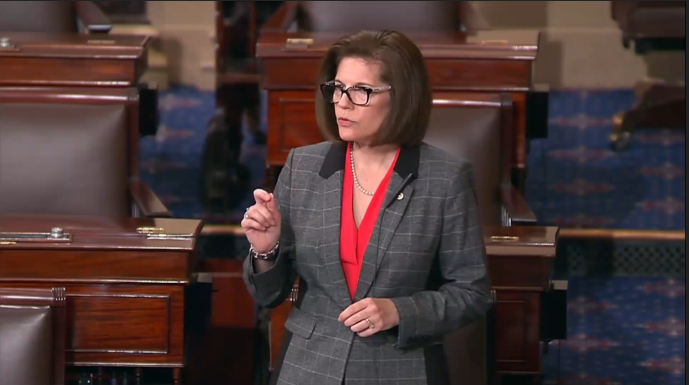Washington, D.C. – U.S. Senator Catherine Cortez Masto (D-Nev.) spoke today on the Senate floor about the importance of passing three pieces of legislation – the Reauthorization of the Violence Against Women Act, Savanna’s Act and the Not Invisible Act – in order to address the epidemic of violence against Native American women. Senator Cortez Masto delivered her remarks in recognition of the National Day of Awareness for Missing and Murdered Native Women and Girls, which was recognized this past Sunday.
Below are her remarks as prepared for delivery. Senator Cortez Masto’s remarks are available in both AUDIO AND VIDEO FORMAT. You may download video of the speech HERE and audio HERE.
This past Sunday, many Americans joined thousands of survivors and supporters across the country in solidarity to honor the National Day of Awareness for Missing and Murdered Native Women and Girls.
Organizers hosted rallies and benefit runs, communities honored loved ones lost and supporters posted on social media with the hastag #NotInvisible.
For many, this was a day to raise awareness about the alarming number of missing and murdered indigenous women.
But for our tribal communities, a day of awareness only scratches the surface of what is needed to address this epidemic.
Indian Country needs action.
That starts right here, in this Chamber.
And it can start today.
Right now the Senate is considering three pieces of legislation – the Reauthorization of the Violence Against Women Act and my bipartisan Savanna’s Act and Not Invisible Act – that will help combat this crisis.
Passing these bills is critical to protecting the lives of Native women and girls.
The numbers speak for themselves.
More than 80% of Native women will experience physical, sexual or psychological violence in their lifetimes, often in the form of domestic or intimate-partner violence.
One in three Native American women have been raped or experienced an attempted rape.
Murder is the third leading cause of death for Native women and girls.
In addition, Native American women who experience sexual or domestic violence are far more likely to fall victim to sex trafficking.
Even more distressing is the fact that we likely don’t know the full scope of the problem because of underreporting.
In fact, nearly half of tribal law enforcement agencies surveyed believe human trafficking is occurring on tribal land beyond what has been brought to their attention.
Because of a lack of coordination with federal agencies, sparse resources and limited jurisdiction to prosecute crimes, women across Indian Country are dying and disappearing and far too many of their cases go unreported, unsolved or untouched by law enforcement.
This is unbelievable. We must act.
And yet there is no targeted federal plan or strategy to address this epidemic, even as it becomes increasingly clear that we are failing to uphold our trust-responsibility, and even more so we’re failing Native women and their families.
As former Nevada Attorney General, I’ve heard directly from survivors, family members, tribal leaders and law enforcement about the need for immediate action and federal support to address violence in Native communities.
Congress must take concrete action to help support the tribal governments, organizations and law enforcement who are on the front lines every day.
The House of Representatives has already taken an important first step this year by reauthorizing the Violence Against Women Act.
This legislation will protect Native women from the effects of domestic violence, which is an early indicator for nearly half of all murder cases involving women nationwide.
The reauthorization also gives tribal governments additional and much-needed jurisdictional power to directly address violent crime against tribal members on reservations.
My Democratic colleagues and I are committed to fighting for full reauthorization of the Violence Against Women Act, and especially for the important criminal jurisdiction expansions it gives Tribal law enforcement to help get violent offenders off the streets.
And we can’t stop there.
We need to shine a light on the staggering number of missing and murdered indigenous women and ensure we understand the full scope of the problem.
That’s why I’ve also introduced both Savanna’s Act and the Not Invisible Act, bipartisan bills with Senator Lisa Murkowski which are designed to work to directly combat the crisis of missing, murdered and trafficked Native women and give our law enforcement and communities the support they need to protect our Native women and girls.
These bills help stop cases from falling through the cracks.
Specifically, Savanna’s Act works to ensure Indian Country has access to accurate, up-to-date crime databases and state, local, and tribal law enforcement can implement guidelines for responding to relevant criminal cases.
The Not Invisible Act ensures that the federal government is working across agencies to best use its resources to address violence against Native women, while recognizing the unique challenges faced by tribal communities.
The bill also creates an advisory committee to examine ways to reduce violent crime, sexual assault and trafficking in tribal communities.
These bills, along with the reauthorization of the Violence Against Women Act, are critical to keeping Native women and girls safe.
My home state of Nevada is home to many tribal communities.
These communities are full of mothers, daughters, sisters and friends whose lives are vibrant and full of potential.
I won’t let these women become a statistic.
It is time to take action, and I’m committed to doing all I can in the Senate to fight for justice for Native American women and girls.
###
